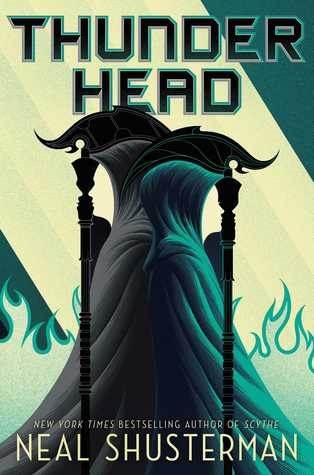
By Rudy Mix
An omniscient being, intriguing politics, and teenagers just trying to understand society are all present in this book and its prequel. Scythe is the first book in the Arc of a Scythe trilogy, written by Neal Shusterman. Though Scythe remains a wondrous book that introduces a complex dystopian world, it seems as though the author outdid his previous work by writing the sequel to Scythe, Thunderhead.
Thunderhead is well written with elements of surprise, intrigue, and even a little bit of comedy. However, the book really shines with its characters and its study of human nature. Both of these show how developed this world is, with the rules of certain places to how two separate governments function.
Thunderhead is about trainees Citra Terranova and Rowan Damisch, who have both become Scythes, Rowan illegally being one, while Citra is ordained as a scythe in proper tradition. The story is also about Greyson Tolliver, a man wanting to be part of the government, except things take a turn for Greyson when he interrupts Scythe’s actions. This trio of characters carries out their stories, each showing a different part of the society, and how flawed the society is.
Shusterman shows a gorgeous but flawed world, most of it seen by an omniscient, robotic overlord, the Thunderhead. The Thunderhead helps society by providing a healthy living environment, but it must stay separate from the Scythes, not silent. This omnipresent being views almost everyone’s actions, commenting on them at the beginning of every chapter. These parts of the book are where the passages seem so small and insignificant, yet are so important to the overall story. The Thunderhead studies humanity in these small sections, talking about itself and its constantly forgiving relationship. Every time that I read these sections, I was gripped by the soliloquies of the overlord, demonstrating how it has a personality, but no solid form.
Shusterman presents a great study of humanity not only through the Thunderhead but also through the main characters of the book, teenagers questioning society and all of its laws. The main characters break the rules constantly, facing the repercussions of any decision they make. Yet, these characters continue breaking the rules and making society a better place by questioning it.
Another way that Shusterman really delivered with Thunderhead was the characters. Whether it was the villains, the heroes, or just mere passerby, they all felt so real with their actions and reasons for them. For example, near the end of the book, there is a Scythe who tries to love the main villain, something that is not allowed by the Scythe commandments. The Scythe is turned down and makes such great actions that the change in character makes the Scythe so believable as a character.
Shusterman also does this with the main character Rowan Damisch. Rowan is a kid who does not understand the rules that the Scythes have made and he wishes to stop a “new order” of Scythes from rising. He takes up the name Scythe Lucifer and murders or attempts murder on Scythes unworthy of their position, those who take joy in killing. Rowan does not change his ways completely after he meets with his master, but he does change his methods. Changing his methods to something much more sincere, something that would sort of align with what he wants to be.
Overall, Thunderhead is a great sequel that shows not only how humanity can doom and save itself, but also has a gripping plot that leaves you wishing for more. Shusterman really outperformed himself, and this book is quite deserving of a 4.5 out of 5-star rating.